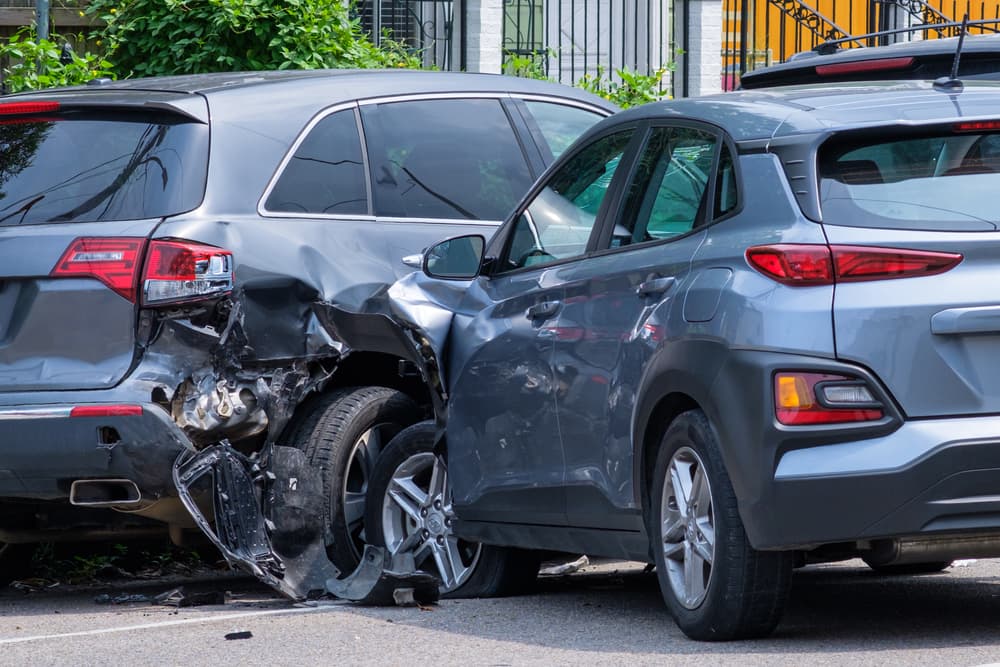Fear, panic, and hopelessness. These are common feelings in the immediate aftermath of an accident that has resulted in an injury. One of the challenges is that these situations require someone to be calm, cool, and collected, not wishing to jeopardize their legal options. This is easier said than done.
Actions at the Accident Scene
After an accident, some people remain calm, some panic, and others take charge and do everything correctly.
After an accident:
- Make sure no one is in danger of further injury
- Notify the police, or an immediate supervisor of the accident
- Obtain the names and contact information of bystanders or witnesses
- Document the scene (take photographs of all vehicles involved and any other damage to property, take notes about what may have caused the accident)
- Notify emergency medical services (e.g., contacting 911)
Take these steps whether the accident involves motor vehicles or if an accident occurs on someone’s property. The last thing anyone needs is someone suffering an additional injury or someone else suffering an injury needlessly.
Reporting an Accident When Someone Is Injured
Once you notify the appropriate parties of the accident and no one is in harm’s way, protect your legal claim. One of the most common missteps that occur following an accident is the incidental apology when the victim inadvertently takes partial responsibility for their injury.
This may seem far-fetched, but it happens more frequently than most think. Think about this: When a car accident occurs, it is typical for someone involved to blurt out something like, “I never saw him/her coming.” An insurance company will view this statement as accepting partial culpability for the accident.
In a slip and fall accident, a victim may comment, “I did not notice that,” referencing a loose piece of tile or carpeting, or, “I should have been paying better attention.” When made by an injured victim, Comments like these could indicate they share fault for the accident or that their inattentiveness is responsible for their injury.
Seeking Medical Attention Following an Injury
One of the most frightening things to deal with in the immediate aftermath of an accident is injuries. Unfortunately, many victims feel that if they cannot see blood or are not in severe pain, their injuries are too mild to seek medical attention, or they are not injured. This is a mistake.
We tend to forget the wonder of our bodies. Our bodies protect us from pain, especially after an accident. It is natural for our bodies to go into fight or flight mode. Inevitably, what happens is our systems get flooded with adrenaline.
This is one reason we don’t always sense pain after an auto accident. Our bodies attempt to protect us from pain, meaning we might not be aware of an injury for hours or even days following an accident. Please do not lose sight of the fact that everyone handles trauma differently, and therefore, it is common not to feel any pain, even after a serious injury.
It is imperative that anyone who has suffered a fall, been in a car accident, or suffered a blow seek medical attention immediately. The victim should inform the physician about the reason for their visit. When a medical professional understands the victim has post-accident trauma, they can proceed accordingly to rule out a serious injury.
Maintaining Physical Health Following an Accident Injury
After an accident victim has been seen by a physician, following the instructions is necessary. Depending on the extent of the injuries suffered, this could involve several things, including pain management, follow-up tests, physical therapy, and seeing a specialist. While these orders may frustrate you, the more closely you follow a doctor’s instructions, the better for you in the long run.
No two people will react the same way to an injury. Some of the factors which will impact recovery time include:
- Victim’s age – The younger the victim, the more likely they are to heal quickly.
- Severity and type of injury – Broken bones will heal over four to six weeks. However, recovering from head, neck, or back injuries could take significantly longer.
- Victim’s pre-accident health – The healthier someone is when they suffer an injury, the more likely they may recover quickly.
Accident injury victims are in a hurry to return to their pre-accident health. However, it is never a good idea to rush the healing process because this could lead to additional problems. When someone suffers an injury in an accident, they should pay attention to the signals their body sends and carefully document any changes that may cause concern. Remember, some injuries may not show up for a few days or as much as a week following an accident.
Insurance Claims Following an Accident Injury
Before filing an insurance claim, it is suitable for an accident victim to contact an accident injury attorney first. This step is essential because it can help victims protect their legal rights. Whether an injury occurs on someone’s premises or the victim sustained injuries in a car accident when not at fault, they may need legal advice as to how to proceed.
Here are some of the things an attorney can help an accident injury victim understand:
- Florida’s no-fault auto insurance – Drivers on Florida roadways must maintain personal injury protection (PIP). However, injury victims can go outside the PIP coverage to secure compensation for their injury in most cases.
- Establishing liability – Regardless of the type of injury a victim has suffered, evidence is required to show who was responsible for the accident. There may be more than one person or party responsible for an accident victim’s injuries in some cases.
- When to file a claim – While all accident victims are bound by Florida’s statute of limitations—Allowing up to four years to file a claim—some issues determine the best time to file a claim. The victim should clearly understand how long they will need medical treatment for their injury and when they can return to regular employment, if at all.
- Explaining legal options – A personal injury lawyer can explain an accident victim’s legal options and explain the pros and cons of these options.
- Negotiate with insurers – When hiring an attorney, they can handle negotiations on behalf of the victim to ensure they are treated seriously and fairly by insurers.
No one expects accident victims to understand the complex handling of a personal injury claim. Because of the laws surrounding filing personal injury claims in Florida, an accident victim should consult an attorney who has specific experience handling the types of claims which apply to their specific case.
Avoiding Insurance Adjuster Traps
There is a strong possibility that one or more insurance adjusters will contact a victim in the days following an injury.
There are some things victims should be aware of when an adjuster reaches them:
- Never provide a recorded statement without your lawyer – Whether involved in discussions with their insurer or the liable party’s insurer, a recorded statement should not be authorized. These recordings can provide “snippets” of information taken out of context to damage a victim’s claim.
- Don’t sign medical releases – Have a lawyer review any medical release forms. Victims should discuss any prior injuries similar to the injuries resulting from an accident with their lawyer.
- Refer them to an attorney – In most cases, the best option for a victim is to allow their attorney to deal with insurance company adjusters. Remember, they work for the insurance company’s benefit, not yours.
Insurers hire adjusters to investigate claims. A skilled adjuster knows what questions to ask and how to ask them to solicit information to help them reduce their employer’s exposure to settling a large claim. They also have a legal team backing them up to make sure they know just how far they can go legally to protect their employer. When a victim has a lawyer helping them, it levels the playing field.
Insurance Company Claims Processing and Handling
Negotiating with insurance companies is never easy. Every insurance company wants to protect its bottom line, which means they want to pay as little for every claim. This puts them at direct odds with the goals of an accident victim.
After all, when someone has suffered an injury that causes them to have to pay out of pocket for additional medical care and are losing money because they can’t work, their financial status is in jeopardy.
No insurance company will advise a victim of injury about their rights. Whether someone files a claim with their insurer or the negligent party’s insurance company, negotiations need to take place. No matter the victim’s costs, the insurance company has one focus: to pay as little as possible for an accident claim.
Negotiations are challenging.
Insurance companies may use some interesting techniques to minimize the amount they have to pay, including:
- Claiming injuries are not as severe as the victim claims
- Claiming the victim is partially at fault for the accident
- Claiming the victim had pre-accident injuries
- Denying liability outright
These are a few of the issues you are likely to encounter. An attorney knows these tactics and will push back against them.
Insurance Company Offers Settlement
Some accident victims may get a fast settlement offer from an insurance company. When you receive this speedy settlement, you must take the utmost caution. A victim should never accept a settlement offer without having the terms and conditions of such an offer reviewed by a lawyer. While an insurance company may suggest that their first offer is their best offer, this is seldom the case. Keep a few things in mind:
Serious Injury and Fast Settlement Offers
The more serious the injury, the more likely an insurer is to offer a fast settlement. There is a reason for this. The faster an insurer can settle, the more likely they will pay less than the victim might otherwise be eligible to collect.
Liability and Fast Settlement Offers
Once an accident victim has accepted an injury settlement, the insurance company is no longer liable for any losses associated with an injury. Ultimately, this could mean a victim could lose thousands of dollars by accepting a fast settlement offer. Victims could suffer serious financial consequences if a settlement offer is accepted too quickly, depending on the type and severity of an injury.
Maximum Medical Recovery and Fast Settlement Offers
Every accident victim reaches a point where their physical condition is as improved as it will be following an injury. This state is known as maximum medical improvement (MMI), which means that regardless of any future medical care, rehabilitation, or prescribed treatments, the victim will not improve further. If a settlement offer comes before this occurs, the claim may not cover potential medical bills and wage losses.
These are some reasons to avoid accepting fast settlement offers, no matter what an insurer may claim about the offer being the best they will make.
Contact an Accident Injury Lawyer
The most important step an accident victim can take is to contact a personal injury attorney. Only then can they be sure someone will be available to answer questions, the field insurance company calls, and protect their legal rights. Working with a lawyer allows the victim to focus on their physical recovery and still feel confident someone with their best interests in mind will handle their claim.



